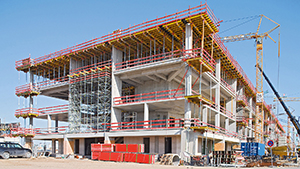
Construction of Berlin's new airport, already two years behind schedule and at least $1.3 billion over budget, has hit yet another hurdle stemming from an alleged bribery scandal.
When Netherlands-based design and engineering firm Arcadis in May received an employee report of a bribe attempt by a Berlin Brandenburg Airport official, it immediately reported it to authorities, says Jost Slooten, spokesman for Arcadis.
“We are working with the authorities, who are still trying to determine exactly what happened,” Slooten says. “But we are not a part of the investigation.”
Airport operator Flughafen Berlin Brandeburg GMBh (FBB) said in a statement that prosecutors were investigating two accused associates and a chief suspect for “classic corruption” in business dealings, while tendering contracts for work on the airport. FBB would not name the suspects, but The Local, an English-language newspaper based in Berlin, reported that technical director Jochen Grossman was terminated for demanding a bribe from Arcadis. Grossman had only been in the position since April. His predecessor, Horst Amman, served a stint as technical director from August 2012 to October 2013.
This is the latest episode in the troubled project, which also has experienced problems with its fire-safety system.
“I think there was too much enthusiasm about using new equipment and technology, and now they are realizing 'Oh my God, it doesn’t work,’” said a spokesman for the German Federation of the Construction Industry, Bauindustrie. “There are very strict rules for these kinds of systems in Germany, and until it works we cannot get permission to use the airport.”
Arcadis' current work on the airport involves fixing fire control and exhaust systems, Slooten says. Siemens, the designer of the system, did not respond to ENR’s request for comment.
Bauindustrie has been critical of the government’s handling of the airport construction, having stated that the job should have been handed over to a general contractor who had more expertise in construction management.
“Public authorities are shy about using general contractors because there is some favoritism in Germany shown to medium-sized and family-owned companies,” Bauindustrie says. “So they didn’t make one tender for the airport, but made them all separate—for the tarmac, for the runway, for the building, for the building controls.”
Indeed, like the recent corruption case, most of the problems with Berlin’s new airport have come from the tendering process, Bauindustrie says. “In the public sector there is always this attitude that, ‘We can do it cheaper,' but if a private investor comes to you as a general contractor they usually have a clear idea of what they want and the price they can do the job for.”
Berlin officials, Bauindustrie adds, initially received bids from general contractors in the $1-billion range to build the new airport. “Well they thought that was too expensive," the agency says, noting that costs could escalate as high as $4 billion. "There is no end in sight.”
The week before the corruption case broke, FBB settled a $64-million lawsuit brought by Air Berlin, Germany’s second biggest airline, for damages it has sustained from the delayed opening of the terminal.


Post a comment to this article
Report Abusive Comment